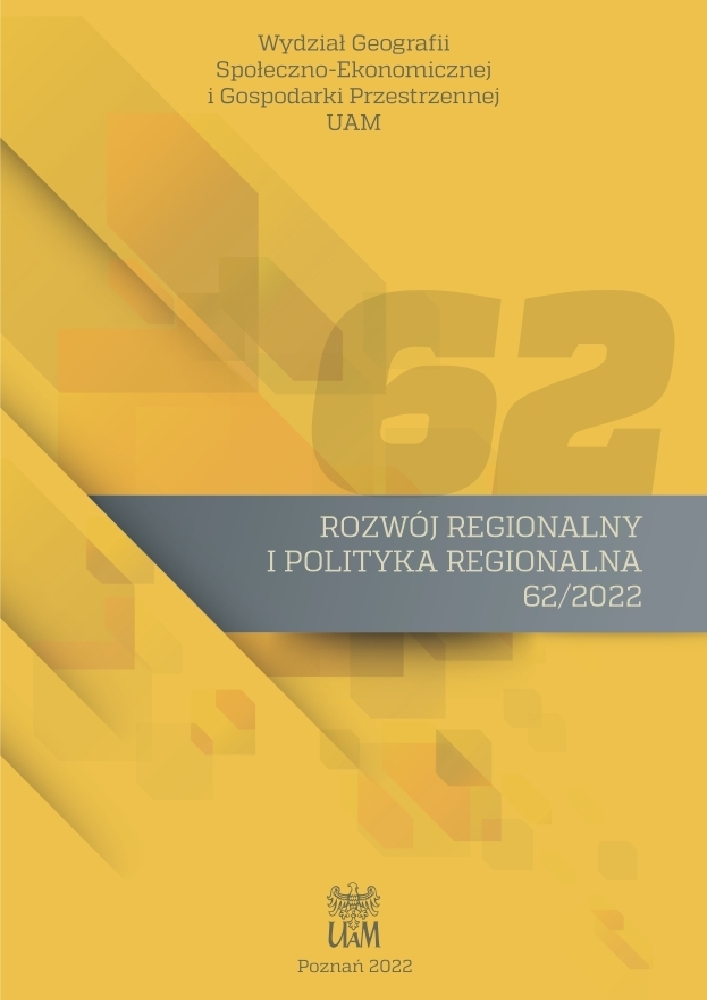Abstract
The main aim of the article is to describe the changes taking place in service facilities located in the Poznań agglomeration as a result of the COVID-19 pandemic. The research procedure aims to answer the following questions: (1) what was the impact of the pandemic on service (depending on the type and location of the facility); (2) how behavior of service consumers changed during the pandemic, and whether some of these behaviors remained after the end of the pandemic period. The data for analysis come from research conducted in June 2022 using the survey technique among 198 service outlets and 283 inhabitants of the Poznań agglomeration understood as the city of Poznań and Poznań poviat. The results of surveys conducted in the Poznań agglomeration confirm the conclusions of national and international studies showing that the crisis caused by the COVID-19 pandemic has significantly affected the entire economy, but hotel and catering services have suffered the most. Tourism related companies turned out to be the most vulnerable to the crisis caused by the pandemic and, in the absence of an alternative in the form of electronic services, were placed in the category of the biggest losers among service sector economic operators. The effects of the pandemic were also felt by retail outlets, although in this case the location of the outpost and the type of assortment sold were important. In general, retail outlets located in city centers and shopping centers, trading in non-food products, were harder hit. Business Services and ICT services turned out to be the most resistant, as they were relatively easily transferred to the network and provided remotely.
References
Benanav A. 2021. Service work in the pandemic economy. Service Work in the Pandemic Economy. International Labor and Working-Class History, 99: 66-74. https://doi.org/10.1017/S0147547920000216 DOI: https://doi.org/10.1017/S0147547920000216
Burkle F.M. Jr. 2006. Globalization and disasters: Issues of public health, state capacity and political action. Journal of International Affairs, 59(2): 231-265.
Caroll N., Conboy K. 2020 Normalising the "New normal": Changing tech-driven work practices under pandemic time pressure. International Journal of Information Management: 102186. https://doi.org/10.1016/j.ijinfomgt.2020.102186 DOI: https://doi.org/10.1016/j.ijinfomgt.2020.102186
Chang S.E. 2010. Urban disaster recovery: a measurement framework and its application to the 1995 Kobe earthquake. Disasters, 34: 303-327. https://doi.org/10.1111/j.1467-7717.2009.01130.x DOI: https://doi.org/10.1111/j.1467-7717.2009.01130.x
Dominiak J. 2022. Wpływ pandemii COVID-19 na zmiany w sektorze usług w Polsce. Prace Komisji Geografii Przemysłu Polskiego Towarzystwa Geograficznego, 36(2): 126-136. https://doi.org/10.24917/20801653.362.8 DOI: https://doi.org/10.24917/20801653.362.8
Gray R.S. 2020. Agriculture, transportation, and the COVID-19 crisis. Cand. J. Agr. Econ., 68: 239-243. https://doi.org/10.1111/cjag.12235 DOI: https://doi.org/10.1111/cjag.12235
Gunay S., Kurtulmus B.E. 2021. COVID-19 social distancing and the US service sector: What do we learn? Research in International Business and Finance, 56. https://doi.org/10.1016/j.ribaf.2020.101361 DOI: https://doi.org/10.1016/j.ribaf.2020.101361
GUS 2021. Wpływ pandemii COVID-19 na koniunkturę gospodarczą - oceny i oczekiwania.
Javed A. 2020. Imact of COVID-19 on Pakistan's services sector. Jurnal Inovasi Ekonomi, 5/3: 107-116. https://doi.org/10.22219/jiko.v5i03.12194 DOI: https://doi.org/10.22219/jiko.v5i03.12194
Keesara S., Jonas A., Schulman K. 2020. COVID-19 and health care's digital revolution. N. Engl. J. Med., Apr. 2 [E-pub ahead of print].
https://doi.org/10.1056/NEJMp2005835 DOI: https://doi.org/10.1056/NEJMp2005835
Lee C.K., Song H.J., Bendle L.J., Kim M.J., Han H.S. 2012. The impact of non-pharmaceutical interventions for 2009 H1N1 influenza on travel intentions: a model of goal-directed behavior. Tourism Management, 33(1): 89-99. https://doi.org/10.1016/j.tourman.2011.02.006 DOI: https://doi.org/10.1016/j.tourman.2011.02.006
Liu, Chuan, Black W.C., Lawrence F.C. , Garrison M.E.B 2012. PostDisaster Coping and Recovery: The Role of Perceived Changes in the Retail Facilities. Journal of Business Research, 65(5): 641-647. https://doi.org/10.1016/j.jbusres.2011.03.004 DOI: https://doi.org/10.1016/j.jbusres.2011.03.004
Loayza N., Eduardo O., Rigolini J., Christiaensen L. 2012. Natural disasters and growth: going beyond the averages. World Dev., 40(7): 1317-1336. https://doi.org/10.1016/j.worlddev.2012.03.002 DOI: https://doi.org/10.1016/j.worlddev.2012.03.002
McKibbin W., Fernando R. 2020. The Global Macroeconomic Impacts of COVID19: Seven Scenarios. Australian National University, CEPAR, March 2020. https://doi.org/10.2139/ssrn.3547729 DOI: https://doi.org/10.2139/ssrn.3547729
Maital S., Barzani E. 2020. The Global Economic Impact of COVID-19: A Summary of Research. Samuel Neaman Institute for National Policy Research.
Orzeszak K. 2022. Wpływ polityki lockdownów na funkcjonowanie branży zakwaterowanie i gastronomia w Polsce. Współczesna Gospodarka, 13(1 (37)). https://doi.org/10.26881/wg.2022.1.04 DOI: https://doi.org/10.26881/wg.2022.1.04
Page S.J., Yeoman I., Munro C., Connell J., Walker L. 2006. A case study of best practice - VisitScotland's prepared response to an influenza pandemic. Tourism Management, 27(3): 361-393. https://doi.org/10.1016/j.tourman.2006.01.001 DOI: https://doi.org/10.1016/j.tourman.2006.01.001
Pearson M.M., Hickman T.M., Lawrence K.E. 2011. Retail recovery from natural disasters: New Orleans versus eight other United States disaster sites. Int. Rev. Retail Distrib. Consum. Res., 21(5): 415-444. https://doi.org/10.1080/09593969.2011.619665 DOI: https://doi.org/10.1080/09593969.2011.619665
Shingal A. 2020. Services trade and COVID-19, VoxEU online article, CEPR Policy Portal (https://voxeu.org/article/services-trade-and-COVID-19; accessed: 7.05.2020).
Stojczew K. 2021. Ocena wpływu pandemii koronawirusa na branżę turystyczną w Polsce. Prace Naukowe Uniwersytetu Ekonomicznego we Wrocławiu, 65(1). https://doi.org/10.15611/pn.2021.1.09 DOI: https://doi.org/10.15611/pn.2021.1.09
Vitálišová K., Vaňová A., Borseková K., Helie T. 2021. Impacts of the COVID-19 pandemic on the policy of cultural and creative industries of Slovakia. Scientific Papers of the University of Pardubice, D, 29(1): 1241. https://doi.org/10.46585/sp29011241 DOI: https://doi.org/10.46585/sp29011241
Wilder-Smith A. 2006. The severe acute respiratory syndrome: impact on travel and tourism. Travel Medicine and Infectious Diseases, 4: 53-60. https://doi.org/10.1016/j.tmaid.2005.04.004 DOI: https://doi.org/10.1016/j.tmaid.2005.04.004
Xiang S., Rasool S., Hang Y., Javid K., Javed T., Artene A.E. 2021. The Effect of COVID-19 Pandemic on Service Sector Sustainability and Growth. Frontiers in Psychology, 12. https://doi.org/10.3389/fpsyg.2021.633597 DOI: https://doi.org/10.3389/fpsyg.2021.633597
License
Copyright (c) 2022 Joanna Dominiak

This work is licensed under a Creative Commons Attribution 4.0 International License.

